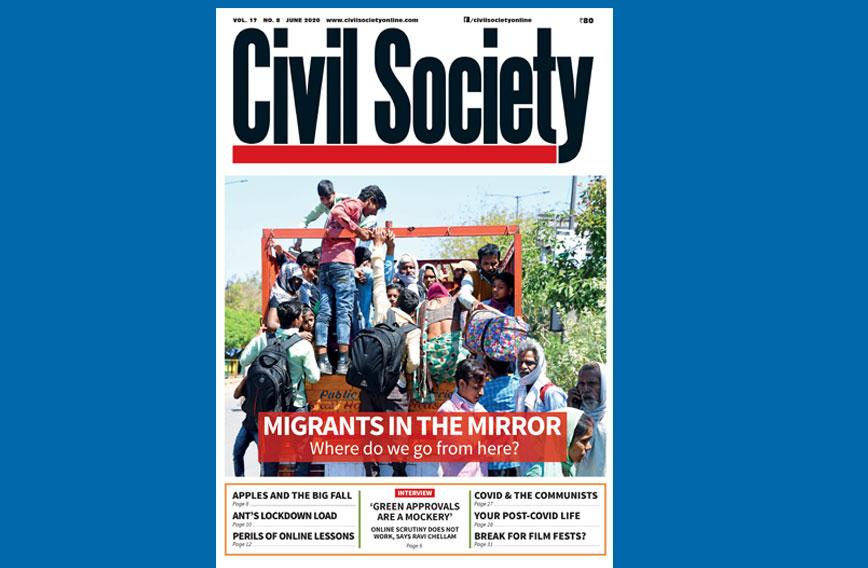
One more issue under lockdown
June 2020
This is the third issue of Civil Society brought out in lockdown conditions. It means we can’t print and distribute, but a PDF of the issue reaches your inbox and the stories are on our website. We have been functioning in a limited way from our office and mostly from home. We also haven’t been able to travel. In such circumstances, it is not particularly easy but we have tried to bring together for this issue interesting stories from all over the country.
What we now know about migrant workers should tell us a lot about ourselves. If they hadn’t burst on to the scene, as they have in recent weeks because of the coronavirus, it is certain that their exploitation would continue without remorse amid claims of economic growth and declining poverty.
The picture now is very different. It is clear and for all to see that the majority of the workforce in India actually has no rights or benefits to speak of. They turn up in cities to escape rural distress, but their hopes and aspirations aren’t realized here. They merely end up as cheap labour. Laws exist, but are inadequate and not enforced. No one seems accountable. The responsibility for this state of affairs cuts across parties and governments.
In this magazine we have covered unorganized labour from time to time. But with this cover story we take a comprehensive look at the issues relating to migrant workers. We have three honest voices in Chinmay Tumbe, Shyam Sundar and Rajiv Khandelwal. Speaking with them has helped us understand the legal, economic and social aspects better.
Will things improve? It is worrisome that laws protective of workers in some states are being dismantled in the name of economic reforms. If this were to become a larger trend it would have disastrous consequences. But perhaps in a higgledy-piggledy way things might also get better. Some employers may choose to be more humane in their treatment of workers and there are states waking up to the reality that they need migrants and should treat them well. What is clearly needed is a national initiative to envision improvements in workplaces, wages and terms of employment.
Is distance learning through the internet and television adding up to anything or is it just driving everyone crazy? We spoke to students, parents and teachers and the story we have is that it is not going to be easy. Such are the disparities, both social and economic, that not everyone can cope with distance learning. Teachers too need to reorient themselves and make the shift from classrooms to Zoom or whatever. It seems there is no viable substitute for school, as we know it.
Many NGOs have been working tirelessly through these difficult days. They have done much better than political parties. The government should be appreciative of their efforts. Some of them work in remote locations under adverse circumstances. The Action Northeast Trust or Ant, led by Dr Sunil Kaul, is an example with its mental health camps in rural Assam.
Comments
Currently there are no Comments. Be first to write a comment!



